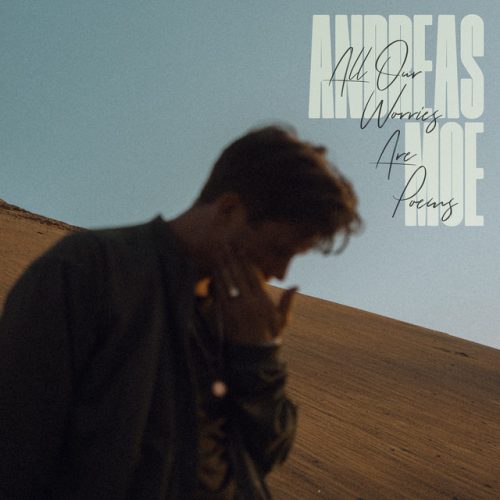Andreas Moe has an incredible voice.
The moment that Moe transitions from the textured substance of his lower register into a honeyed falsetto in the opening lines of first track “Fire and Stone” on his newest record All Our Worries Are Poems, that much becomes clear.
Of course, if you’ve tracked with Moe’s career, that’s no surprise. The Stockholm-based artist broke into the public consciousness with an iconic feature on Avicii’s 2011 hit, “Fade Into Darkness”. It’s a song that you can almost definitely hum from memory if you’ve listened to any pre-2015 EDM. And, in my opinion at least, it’s a track that owes at least as much to Moe’s emotive vocal performance as it does to Avicci’s production wizardry.
So, yeah, Andreas Moe can sing.
But he can also write.
All Our Worries Are Poems is, at root, a songwriter’s record. It’s acoustic, for one thing, and everyone knows that acoustic records are almost automatically songwriters’ records. Driven nearly entirely by finger-picked or softly strummed guitars, light keys, and tasteful accents like subtle strings and harmonies, this certainly has that kind of sound. And while it’s not lyrically complex, it’s packed with sentiment that’s undeniably compelling.
Sometimes I wish we were strangers
So I could start all over
Moe sings on second track “Rise & Fall”. It’s the kind of line that might sound trite in the wrong hands – but when it’s perfectly placed and delivered with an earthy artfulness that evokes shades of Chris Martin, it taps into something deep.
The record is packed with moments like it. For example:
Hey Lulu, everybody loves you now
Hey Lulu, don’t you let it get you down
Hey Lulu, everybody loves you now
Moe offers on “Hey Lulu”. It’s an earworm of a track that I don’t quite understand the lyrics to, but I’ve had trouble getting the melody out of my head, and something about it gives me chills. I heard one of my favorite artists say that you could tell whether songs were good if, when you cut everything away to sing them with an acoustic guitar, they still made you feel something.
Moe’s songs do.
A perfect example of this is found on what’s perhaps the album’s poppiest track, “Holding On”. It’s an upbeat, driving song that feels like it’d be easy to turn into the kind of electro-arena ballad that Avicii would’ve loved.
But I think it might be more impactful in its simple state.
I tell myself it’s real but I know it never was
I’m holding onto something I could never make my own
Moe sings in the chorus over sparse, folky electric guitar and simple strumming. The result is beautiful. It turns out that, stripped of the flamboyant flourishes of electronic production, Moe’s songs have a surprising and simple vibrancy.
On All Our Worries Our Poems, as in all Moe’s work, they’re brought to life by his voice – but they have a life of their own, too.
Stream Andreas Moe’s new record on the music service of your choice at this link, or on Spotify below.







